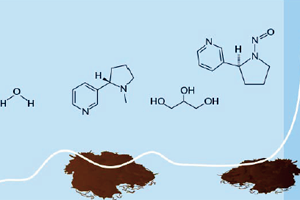Imperial Brands says that recently-announced changes to the US federal corporate tax rate are not expected to materially impact the group’s adjusted effective tax rate in the future.
‘The group benefits from substantial US tax amortisation of goodwill and intangibles which contributes to a relatively low adjusted effective tax rate,’ Imperial said in a note posted on its website yesterday.
‘For the year to 30 September 2018 we currently anticipate that the reduced taxation of US earnings will result in a benefit of less than one percent to the group adjusted effective tax rate. We continue to expect an overall adjusted effective tax rate for the group of around 20 percent.
‘The group’s US deferred tax assets and liabilities will be revalued to take account of the corporate tax rate changes. This is expected to result in a one-off credit of around £20m which will be treated as an adjusting item in the current year and will therefore not impact adjusted earnings.’
Category: Taxation

Relaxed over tax changes

Illicit cigarettes lead market
Malaysia’s Royal Customs Department last year seized illicit cigarettes on which RM1 billion in taxes should have been paid, according to a story in The Malaysian Reserve.
The Department was said last year to have intensified its operations aimed at curbing the increase in illicit tobacco products in the country.
But it has a struggle on its hands. The high retail price of licit cigarettes in Malaysia makes the country a haven for smugglers and some retailers who are able to reap huge profits as smokers seek cheaper alternatives.
The government increased cigarette taxes by 110 percent during the past five years so that whereas licit brands sell for about RM17 per pack, illicit products sell for RM4-5 per pack.
An additional problem for the Department is that Malaysia’s long coastline makes monitoring the entry of illicit cigarettes difficult.
Illicit cigarettes were said last year to have taken about 57 percent of Malaysia’s 18-billion market.
The Malaysian Reserve said it was estimated that the government had lost billions in tax revenue due to the mushrooming of illicit cigarettes.
Belarus upping production
A Lithuanian member of the EU Parliament has asked whether the European External Action Service (EEAS) is going to address the issue of cigarettes manufactured in Belarus being sold in EU member states.
In a preamble to her questions, Laima Liucija Andrikienė said the government of Belarus had recently announced that a private investor would increase the manufacturing capabilities of the Grodno Tobacco factory.
According to the announcement, the increase in production was due to start in January 2018, in response to a growing demand for Belarusian cigarette brands.
The EU was among the target markets.
The MEP alleged that Belarusian cigarette brands manufactured at the Grodno factory were smuggled into more than 20 member states where they could not be legally sold.
They already represented around EUR1 billion in yearly tax losses.
Andrikienė asked:- Will the EEAS address this issue with the government of Belarus?
- Will the EEAS request information about the member state markets on which Belarusian cigarette brands can legally be sold and how the exports will be tracked to avoid ruptures in the supply chain?
- Will the EEAS point out that low taxes applied in Belarus on cigarettes are the incentive for smuggling into the EU?
The EU Commission is due to answer these questions in writing.

Blunt instruments preferred
With the tax on tobacco increased a further 10 percent in New Zealand this month, one of the country’s major supermarket chains has started selling electronic cigarettes, according to a story in The New Zealand Herald.
Progressive Enterprises, which owns Countdown, FreshChoice and SuperValue supermarkets, confirmed it had been trialing the sale of e-cigarettes without nicotine in 20 of its stores around the country since December 20.
The Herald said the move could be a major step toward making the sale of e-cigarettes mainstream in New Zealand.
According to the Ministry of Health, selling non-nicotine e-cigarettes is legal.
The sale of nicotine-based products for e-cigarettes is currently illegal, though they are widely available and their status is under review by the government.
The new Labor-led government has continued the previous administration’s policy of an annual increase in excise tax on tobacco in support of its Smoke-free 2025 initiative.
The Ministry of Health said it believed increasing the price of tobacco was the single most effective measure to reduce tobacco consumption.
In principle yes; but…
There are, as a matter of principle, no limits on the number of duty-paid cigarettes a private individual can buy and transport with him when traveling between EU countries, the EU Commission has said in answer to two questions by the Lithuanian member of the European Parliament, Bronis Ropė.
But it perhaps should have added that it would be best for the individual if he traveled with a lawyer.
In a preamble to his questions, Ropė said he had been informed that a Lithuanian citizen traveling in his own car through Germany on August 10, 2017, was asked to pay customs duty on 10 cartons of cigarettes – excisable goods legally acquired in Lithuania that he was carrying in his car.
The driver’s wife and young child were also traveling in the car.
Ropė said the German officers, of the Hauptzollamt Magdeburg customs office, had drawn up report No K1/365/2017.
He then asked the Commission:- Whether the German customs officers were entitled to request payment of customs duty for excisable goods that were legally acquired in the EU and were in transit through the territory of Germany; and
- If so, could the Commission please specify the legal grounds pursuant to which German officers are entitled to request the payment of such duties?
In its reply, the Commission said there were, as a matter of principle, no limits on the number of duty-paid cigarettes a private individual could buy and transport with him when traveling between EU countries.
‘Excise duty is due in the member state of purchase and not in the member state of destination, provided that the cigarettes are for the traveler’s own use and are transported by the traveler.
‘To determine whether these products are for the traveler’s own use, member states have to take all the following factors into account:
* The commercial status of the holder of the products and the reasons for holding them;
* The place where the products are located or, if appropriate, the mode of transport used;
* Any document relating to the products;
* The nature of the products;
* The quantity of the products.
‘With regards the last element, EU legislation provides guide levels (800 cigarettes), which member state authorities may use in certain situations. However, these guide levels are indicative only.’
The Commission said it could not comment on the specific case raised by Ropė.
However, it added, EU citizens had access to the competent national courts if they considered that measures taken were unjustified or infringed EU law.
Tracking defended
The EU Commission has said that it has made a priority of minimising the burden of its tobacco-products tracking-and-tracing system on small and medium-sized enterprises, and ‘traditional producers’.
The Commission last week provided written answers to two questions posed by the UK member of the European Parliament, Bill Etheridge.
In a preamble to his questions, Etheridge said that with all large tobacco manufacturing plants having been closed in the UK, leaving thousands of citizens jobless, the tobacco manufacturing sector had been left to a handful of micro or small family-owned companies that were rooted in their original localities.
‘These companies rely on their ability to export the traditional tobacco products (e.g. pipe tobacco, nasal snuff, chewing tobacco) they produce and distribute,’ he said.
‘Is the Commission aware that its decision to extend the scope of “track and trace” to tobacco products destined for export:- ‘Potentially oversteps the mandate that the European Parliament has given to the Commission under the European Tobacco Products Directive (2014/40/EU)
- ‘Establishes a self-imposed trade barrier which disproportionally impacts the smaller and traditional tobacco manufacturers, ultimately driving them out of business?’
The Commission began its reply by saying that tobacco was responsible for 700,000 premature deaths in the Union every year. This made it the ‘most significant’ cause of premature death in the Union.
‘Illicit tobacco products are less likely to be in compliance with tobacco control legislation and provide artificially cheap supplies of tobacco that affect the uptake and prevalence of smoking, in particular for young people,’ the Commission said. ‘The traceability measures provided for in Article 15 of the Tobacco Products Directive (2014/40/EU) constitute a key means for combatting fraud and strengthening tobacco control in the Union.
‘The scope of the traceability measures and in particular the obligation to apply unique identifiers to all tobacco product packets manufactured in the Union is set by Article 15 of Directive 2014/40/EU. In so doing it reflects the obligations of the state parties under the World Health Organization Framework Convention on Tobacco Control’s Protocol to Eliminate Illicit Trade in Tobacco Products, which Article 15 of the Tobacco Products Directive is intended to implement in the EU. Article 8 of the Protocol requires its Parties to establish a tracking and tracing system for all tobacco products that are manufactured in or imported into’ their territory.
‘Minimising the burden of the system on small and medium-sized enterprises (SMEs) and traditional producers has been a priority for the Commission from the outset and a detailed assessment of the measures’ proportionality and expected impact in this respect was carried out. In addition, a number of lighter measures intended to reduce the burden on SMEs have been foreseen throughout the Commission’s proposals.’
Smoking creates poverty
Cigarette consumption is the second largest contributor to poverty in Indonesia, after rice consumption, according to a story in The Jakarta Post citing a National Development Planning Board (Bappenas) statement on Tuesday.
“People shouldn’t be dependent on such an unproductive habit,” Bappenas head and National Development Planning Minister Bambang Brodjonegoro was quoted as saying by tribunnews.com.
Bambang called on the people to stop the bad habit and start spending on more important commodities, such as meat, so they could provide their families with more nutritious meals.
He said the government would never support a decrease in cigarette prices; instead, it would increase prices by imposing a higher excise duty on cigarettes.
“As of September 2017, cigarette consumption contributed 9.98 percent to the poverty rate in urban areas and 10.70 percent in rural areas,” Bambang said.
The contribution of cigarette consumption to the poverty rate was said to have peaked in 2014 at 11.18 percent.
KT&G increases HNB price
South Korea’s largest tobacco maker, KT&G, said today it would increase the price of Fiit, the consumable element of its heat-not-burn (HNB) device Lil, from next week, according to a story in The Korea Herald.
Fiit, a tobacco-filled stick that is used with Lil, was launched at 4,300 won ($4) a pack in November.
The company said the price of Fiit would be increased to 4,500 won a pack, reflecting a recent increase in the individual consumption tax imposed on HNB products and other levies, such as a health promotion fee.
Philip Morris increased the price of Heets, the tobacco stick used with its iQOS HNB device, to 4,500 won last month. It cited similar reasons.
The Herald reported that Fiit sticks were sold in two types, Change and Change up, with the latter offering a fruitier flavor than the former. Both used KT&G’s ‘signature flavor-changing capsules’.
‘Since its November release, Lil has garnered popularity among smokers for its reasonable price, recording sales of 50,000 devices within a month, as of the end of December,’ the Herald said.
BAT expects tax reduction
British American Tobacco has said it anticipates that, for the year to the end of December 2018, the changes brought about by the US Tax Cuts and Jobs Act would reduce the Group’s effective tax rate percentage to the high-twenties.
‘All other things being equal, this would result in a benefit of six percent to full year 2018 earnings per share, supporting our commitment to high single digit earnings growth and increased investment in the roll out of Next Generation Products,’ the company said in a note posted on its website today.
BAT said it noted that approval had been given for the new Act and said that it was continuing to work through the full impact it would have on the company. It said it would provide in February more details about that impact as part of its preliminary announcement for the year ended 31 December 2017.
‘For the year to 31 December 2017 the announced changes will have no impact on the Group’s underlying effective tax rate, which we have previously said we expect to be around 30 percent, BAT said. ‘However, we anticipate that the changes will result in a non-cash exceptional tax credit as a result of the revaluation of deferred tax balances arising from the acquisition of Reynolds American Inc. (RAI).’
Keep digging
China has become the fastest-growing tobacco market, according to a story in the Worker’s Daily citing a report by Zheng Rong, a professor at the University of International Business and Economics.
This is despite the recent imposition of anti-tobacco measures, including cigarette-tax rises.
China has imposed too strict bans on tobacco smoking in more than 20 cities, though the campaign has covered less than 10 percent of the whole country.
Cigarette taxes were raised substantially in 2008 and 2015 but they did not cool demand.
Taxes now account for about 59 percent of the retail prices of cigarettes in China, but they lag behind the global average of 75 percent.
In additional, the disposable income of Chinese smokers was said to have grown by about 85 percent from 2001 to 2016, and even to have doubled among consumers of low-price products.
The incidence of smoking in China among low-income groups is higher than the incidence among high-income groups, and rural residents smoke more than do urban people.
Hu Angang, a professor with Tsinghua University, was quoted as saying that ‘the higher incidence of smoking in poverty-stricken areas and poor families is the main cause of poverty reoccurrence due to the treatment of tobacco-related diseases’.
The global experience indicated that raising taxes on tobacco could effectively reduce the use of tobacco and cut public health expenditures, Zheng said; and he called for higher cigarette prices to reduce smoking among low-income smokers.
Meanwhile, Jiang Yuan, deputy director of the Chinese Center for Disease Control and Prevention’s Tobacco Control Office, said raising the tax and price of tobacco products was one way to control smoking.









